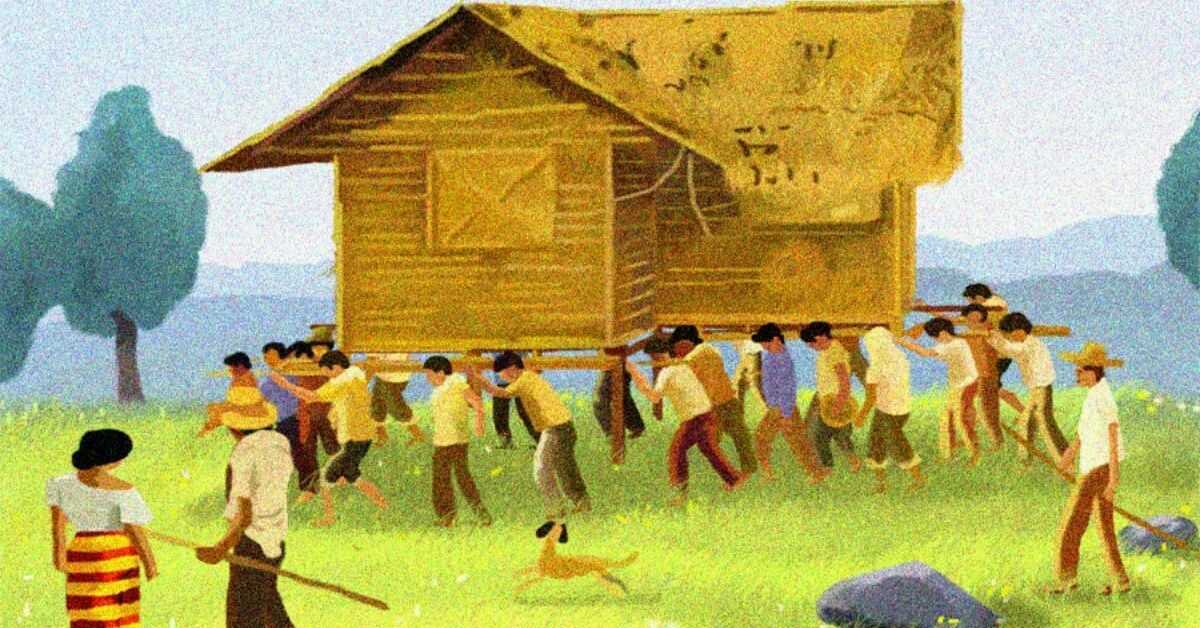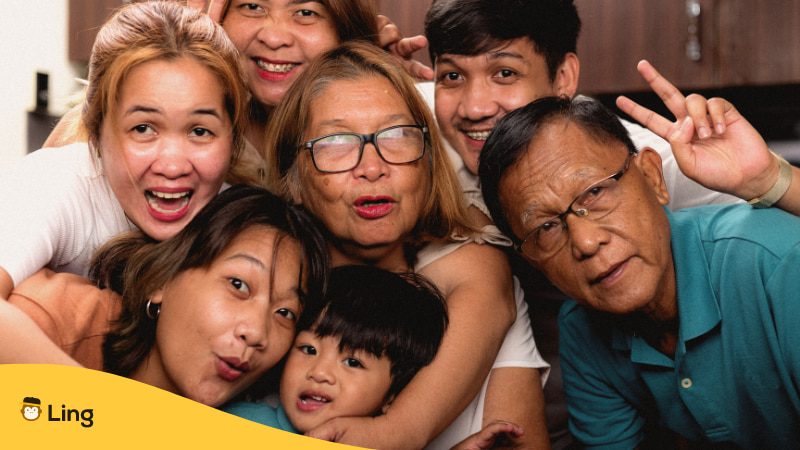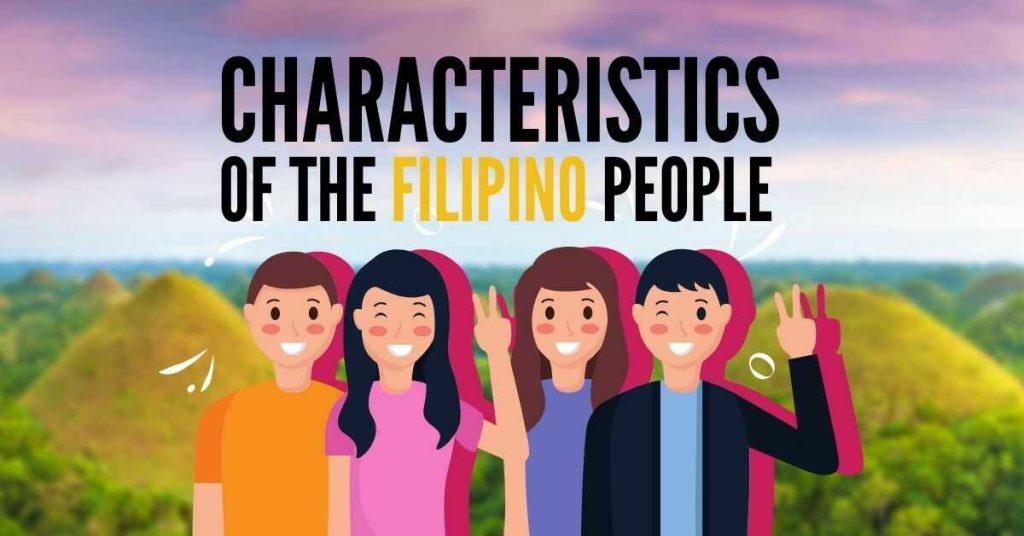Are you wondering what the common traits and characteristics of Filipino people are? In this post, we will do a deep dive into the Filipino character and get to know what sets them apart from our nationalities in Southeast Asia. After all, there must be something truly unique about the locals, which is why several overseas companies look positively at the Philippines. At the same time, we will also walk you through some of the translations of the Tagalog words related to this topic so that you can add them when expressing your love for the Filipino culture.
If there is one thing that makes foreigners fall in love with the Philippines, then that would definitely be because of its citizens. While there is some truth that some people from Asia are considered somewhat cold by nature, you might be surprised to know how much Filipinos love making others feel comfortable around them. For this reason, several have called them hospitable or maasikaso in Tagalog. If you can speak English, you’d be surprised that even street peddlers or tindero (male vendors)and tindera (female vendors) are actually fluent and can understand you!
Aside from learning their official languages, it would be wise to get to know the Filipinos (their values, traits, and behaviors), and if you are up for that, this post is definitely for you.
What Do You Call The People Of The Philippines?
After being conquered by many countries in the past, the Philippines is still in search of its true identity. At present, foreign influences continue to exist in the Philippines’ culture, traditions, and beliefs, yet there are some things that are already truly 100% Filipino. One example of that is their usage of certain terminologies like the one we will discuss below.
If the people from the United States are called Americans, what do you collectively call those hailing from the Philippines? The answer to that is Filipino! Most foreigners find it a bit confusing because the word “Filipino” is also used as a term referring to the country’s national language. In addition, many appear to be baffled whenever they search for the answer to this on the internet since there’s also a term known as “Pilipino.” There are also words like “Pinoy” and “Pinay.” Given the many possible terms to use, you are probably wondering what’s the difference, right? Allow us to explain that further below.
For foreign visitors, you should call the people of the Philippines “Filipino.” If you want to be more specific depending on the gender, you can use “Filipina” to refer to women or just use “Filipino” to refer to males. However, please refrain from calling them Philippino or Filipini as those words are straight-out wrong and will not make sense to the locals.
The other term that the locals use to call themselves and fellow citizens is “Pilipino.” This term is the translated version of their nationality in their national language. Therefore, if you are using Tagalog, you can ask something like this: “Isa ka bang Pilipino?” which translates to “Are you a Filipino?”
Now if you want something that sounds a bit casual to use among Filipinos, it would be wise to call them “Pinoy” or “Pinay.” These are colloquial terms that anyone can freely use, so you do not have to worry whether it will sound rude or something.
What Are The Filipino Values?
When we say values, this term refers to the socially acceptable constructs that all the locals are expected to follow in order to thrive in the community. Like in most countries, the Philippines also has its own range of ideologies, ethical practices, moral codes, etiquette, and values that are promoted by the society no matter where they are in the world. It is quite surprising how even Filipinos born and raised in other countries somehow share the values of the native Filipinos too!
Hiya, Pakikisama, And Utang Na Loob
In this part, let’s talk about the idea of hiya, pakikisama, and utang na loob. These three are some of the most common surface values that any foreigner can observe immediately.
To put it simply: the Filipino value system is mainly centered on the concept of providing and maintaining social harmony in the form of shame/embarrassment or “hiya.” This is somewhat similar to that of other Asian countries like Japan and China, wherein the actions of the locals are influenced by their society. For this reason, Filipinos sometimes do things beyond what is expected of them to save face and get nods and pats from other Filipinos.
If you have been watching Filipino movies or TV series, you probably heard some of these lines before:
- Ano na lang ang sasabihin ng mga tao? (What will other think?)
- Ano na lang ang gagawin nila sayo dahil sa ginawa mo? (What will they do to you because of your actions?)
- Ano na lang ang iisipin ng mga kapitbahay ngayon? (What will our neighbors think?)
These are some of the lines that greatly reflect how Filipinos process whether their actions or decisions are correct in the eyes of society.
Another common value that the locals are very much known for is the concept of “pakikisama” or getting along with the people around you. More often than not, Pinoys go out of their way to do things for the sake of unity and togetherness. It is an intrinsic appreciation for the idea of communal bonding and going out of your comfort zone to conform to what is expected. Thanks to this value, the locals have become the friendliest bunch in the whole world!
And when we talk about Filipino culture, we should certainly not forget the idea of “utang na loob” or gratitude. No matter how small the help is, the Filipinos will do their best to try and extend the same help to you when you are in need. If directly translated, utang na loob in English can be referred to as a debt of one’s inner self.
Popular Characteristics Of Filipino People
As we have discussed in the history of the Philippine flag, the country has been colonized for years and there is no surprise why some of the common Filipino traits are somewhat similar to those of other countries. Spain, Japan, and to American occupation, the country is no stranger to foreigners. Fortunately, there are still some core values passed down by ancestors that remain intact and exist even to this day. One example of that is the Bayanihan, or the spirit of communal work and cooperation with the goal of achieving a goal.
The concept of Bayanihan is deeply embedded in the country’s history and is usually reflected by the imagery of men carrying a bahay kubo or traditional nipa hut. As you probably know, rural areas in the Philippines used to have bahay kubo as their dwelling. What makes the Kubo a good house in the olden days is that it can easily be transferred to a new place anytime, but you cannot do it on your own. Instead, the Filipinos lend a hand and help the family transfer the entire house from one point to another. If you are unsure of how that works, just check out the example photo below.

Once the home transfer is done, Filipino women tend to cook and serve sumptuous dishes in a kamayan style (boodle fight) to thank the generous people who helped them move. While the traditional kubo is no longer that popular, even in the rural areas, the spirit of Bayanihan can still be seen, especially at times of natural disasters and calamities. Given the geographical location of the country, the Philippines always have typhoons which is why neighbors do their best to help each other in their time of need.
Now if you think that that is only what the Filipinos can offer, then you better read the next section below, where we will discuss the five other good traits that will make you re-think life and crave to visit the Philippines as soon as possible!

Filipinos Love To Prepare Great Tasting Food
One of the most popular qualities of Filipinos is that they put a premium on how they serve other people. If ever you get invited to visit a friend’s house, you will be surprised at the very warm welcome you will receive from Filipino parents and family members! Usually, they will let you in on their house in an instant and ask the visitor to sit down and get comfortable.
But the best part of it all? At least one family member will prepare a snack complete with drinks so that you can eat while waiting. After all, Filipinos do not ever want you to leave their house with an empty stomach!
If you visit in the evening, you can expect that they will prepare dinner (and even make sure that they have different putahe or dishes that you are accustomed to) and arrange a guest room for you in case you want to stay. If you partake in a specific festival and the Filipino parents or elders know that you are coming, they will go out of their way to get food specially prepared just for you!

Most Filipinos Have Strong Family Ties
The Filipinos have very close family ties and enjoy spending quality time every weekend. Young adults may have work that is far from home, but it is common for them to go back home, especially to celebrate special occasions and holidays. In fact, traditional families also close their small businesses so long as they get to set aside time to see their family members.
Since they are family-oriented, it is common to see the whole family living in just one place! And when we mean family, we literally mean the extended family to the point that they occupy a whole street!

The Filipino People Are Respectful
As we have emphasized in the basic greetings in Tagalog, one important aspect that you should remember is that Filipinos are very respectful and will always use the words “po” and “opo” at the end of their sentences when speaking with people who are older than them, their family, persons of authority, and even strangers.
It is also expected that the younger people will take the elders’ hands and put them on their forehead and say mano po, which directly translates to “your hand, please.” This gesture is taught at an early age and is still very popular today. So, if you are in homestay accommodation and would like to get social approval, this is a good thing to do. Just make sure to ask if it’s okay first before you grab Filipinos’ hands!

Many Filipinos Are Hardworking And Resourceful
Colonized and oppressed by several countries before, the Filipinos have become hardworking people to the point that they are juggling multiple jobs just to make more money. Instead of just bickering and blaming everything on the government, Filipino values dictate that one should look for new ways to ensure that ends meet even while they are still young. For this reason, you will find a lot of working students who are getting part-time positions or looking to sell food and items online with the goal of sustaining their educational needs.
Since the Philippines is a third-world country, many people still do not make enough for their daily needs. Instead of purchasing expensive items, they try to look for innovative ways, cheaper substitutes, or create their own items.

The Filipino People Are Passionate
No matter what challenges the day has for every Filipino, you will be surprised at how positive their perceptions are. There is much enthusiasm they have about life and work. If you are looking for people who will tirelessly help you in a time of need, you can never go wrong with connecting with the Filipino people.
Filipinos Are Educated
Despite being a third-world country, the Philippines is one of the Asian countries that provide an amazing and educated workforce across the globe. Despite the hardships within the country, the locals strive to pursue further studies to earn a degree and land a high-paying and stable job. For this reason, many Filipinos actually do not just settle for a college degree but also try to get scholarships for graduate studies.
If you are planning to migrate to the country, you will be proud of the high standard of education provided in both private and public schools. For instance, schools usually teach English in elementary school, which has positively resulted in the proficiency of most of the citizens in speaking English. In fact, even those who are not fortunate enough to study in high school can even talk to foreigners in English with confidence.
In other regions, it is also possible for students to learn Filipino, English, and one regional language like Cebuano, Tagalog, Ilocano, or Bicolano! If you plan to get a college degree, you may also opt to take foreign language classes and learn from Filipino instructors who speak French, Mandarin, Japanese, and Malay!
Fun fact: Did you know that the national hero of the Philippines, Jose Rizal, is fluent in 22 languages? If the hero is like that, you can expect that the rest of the locals also share the same love for languages!
Filipinos Are Always Positive
Due to the geographical location of the Philippines, the country is no stranger when it comes to destructive thunderstorms and life-threatening floods. But despite the challenges in life, the locals remain on the positive side because they believe that there is always a rainbow after the rain. Instead of complaining, they try their best to adapt quickly and make hard decisions in an instant.
Don’t believe me? Try to walk the streets of Manila and look for children playing on the street. Try to observe what a kid will do if ever he trips while running or walking. More often than not, you won’t see anger or shame in his actions. Instead, he will just laugh it off and even make fun of himself for the silly action.
Because of this positive outlook on life, Filipinos can survive challenges both in the past and present. And if things do not change, their positivity can even help them in the future.
Other Positive Traits In The Filipino Culture
| English | Tagalog |
|---|---|
| Active | Masigla |
| Adaptive | Nakikibagay |
| Affectionate | Mapagmahal |
| Attentive | Masigasig |
| Careful | Maingat |
| Charitable | Mapagbigay |
| Compassionate | Maawain |
| Cooperative | Matulungin |
| Courageous | Matapang |
| Dependable | Maasahan |
| Determined | Determinado |
| Diligent | Masipag |
| Dutiful | Mausnurin |
| Faithful | Matapat |
| Forgiving | Mapagpatawad |
| Frugal | Matipid |
| Generous | Mapagbigay |
| Honest | Matapat |
| Humble | Mapagkumbaba |
| Industrious | Masipag |
| Kind | Mabait |
| Neat | Malinis |
| Orderly | Maayos |
| Patient | Matiyaga |
| Polite | Magalang |
| Resaonable | Makatarungan |
| Shy | Mahiyain |
| Simple | Simple |
| Strong | Malakas |
| Talkative | Madaldal |
Negative Filipino Traits
As much as we want to say that Filipinos are amazing and that their culture is one of the unique ones out there, there are also negative traits that one should be aware of. There are also times wherein their ideologies or habits are a bit annoying or rude in the eyes of foreigners. So before you befriend or date a Filipino, it would be great if you take note of those that we will discuss below.
Crab Mentality
First, some of the locals have this crab mentality wherein they try to bring other people down due to jealousy or insecurity. People are naturally competitive, but this sometimes can bring out the worst in the Filipinos. One way you can see someone having this sort of mentality is when they consistently spread false rumors about someone or when they speak ill of someone behind their back.
Bahala Na
Second, there is also the toxic trait of saying “bahala na” which can be translated to “come what may.” Others might think this is a harmless trait, but this can be a bit troublesome as it shows that some locals do not like preparing for important things. For example, if a student knows that he will have a test tomorrow, but he did not study, he will just say “bahala na bukas” which means that he is simply brushing it off instead of actually studying. As the saying goes, failing to prepare is a preparation for failure!
Lack Of Self Discipline
Third, some of the locals lack self-discipline to the point that they will break the rules just because it is convenient for them. One example of that is when crossing the streets. While not all roads have traffic lights, it is common knowledge not to cross the road if there is a speeding vehicle. However, some Filipinos will try to cross the road despite the possible negative consequences. Also, some will try to cross even if a huge sign says, “do not cross.”
Filipino Time
Lastly, there’s also what we call a “Filipino time” which means that they sometimes do not show up at the time that both parties agreed on. For example, if you talked with a Filipino and agreed that you would meet at 6:00 a.m., do not be surprised if he shows up at around 6:30! While they do not do it intentionally, foreigners find it disrespectful. However, please do remember that not all Filipinos are like that!
Learn More With The Ling App
As we reach this part of the post, we hope that you were able to learn everything there is about the culture of the citizens in the Philippines. If you enjoyed this post, check out more posts for the Tagalog Language. If you would like to learn more vocabulary, we highly recommend that you check the common cooking terms, popular breakfast food, and sweet desserts.
If you are also interested in getting to know the Tagalog language better, then you should check out the Ling app. This app is a great platform built to level up your understanding of 60+ foreign languages through the help of a gamified algorithm. If you are on the lookout for an app that is exciting and challenging, then download the Ling app today!
Download it on the Play Store or App Store now!









































